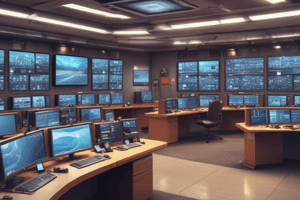Podcast
Questions and Answers
What is the primary responsibility of the Phoenix Regional Dispatch Center during emergency responses?
What is the primary responsibility of the Phoenix Regional Dispatch Center during emergency responses?
- To select appropriate nature codes for incidents based on gathered information. (correct)
- To conduct follow-up investigations on reported incidents.
- To initiate physical responses from fire and police units.
- To provide direct medical assistance to callers.
How do violent incidents typically reach the dispatch center?
How do violent incidents typically reach the dispatch center?
- By automatic sensors installed in crime zones.
- From eye witnesses submitting online reports.
- Through direct reports from medical teams.
- Either directly from the 911 caller or from the PD dispatch center. (correct)
What is considered the weakest part of the information gathering system during an emergency call?
What is considered the weakest part of the information gathering system during an emergency call?
- The incident takers' prior experience.
- The initial information provided by the caller. (correct)
- The verification process performed post-call.
- The technology used for call processing.
What approach are incident takers and supervisors trained to adopt when handling violent incidents?
What approach are incident takers and supervisors trained to adopt when handling violent incidents?
What is the role of the tactical radio operator (TRO) during an incident?
What is the role of the tactical radio operator (TRO) during an incident?
Why is phone communication crucial for the Phoenix Regional Dispatch Center?
Why is phone communication crucial for the Phoenix Regional Dispatch Center?
What should Company Officers and Chief Officers do to ensure effective communication during an incident?
What should Company Officers and Chief Officers do to ensure effective communication during an incident?
What is a critical aspect of the communication loop between the tactical radio operator and on-scene units?
What is a critical aspect of the communication loop between the tactical radio operator and on-scene units?
Flashcards are hidden until you start studying
Study Notes
Dispatch Center Overview
- Emergency responses initiated through calls to 911.
- Phoenix Regional Dispatch Center processes these calls to determine incident nature code.
Incident Information Gathering
- Violent incidents reported directly by 911 callers or through police department dispatch center.
- Consistent methods employed for information gathering, processing, and dispatching.
- Quality, quantity, and timeliness of information dramatically affect the accuracy of incident codes.
Challenges in Information Accuracy
- Initial caller information often incomplete or inaccurate, requiring a cautious approach.
- Incident takers and supervisors trained to adopt a pessimistic stance on service delivery and firefighter safety.
- Weakness in the information gathering system primarily lies with caller-provided details.
Decision Making and Discretion
- Company and command officers exercise discretion when faced with inaccurate or incomplete information.
- Strategic decision-making model enhances system efficiency and incident management.
Tactical Radio Operator (TRO) Role
- TRO is responsible for two-way communication, relaying incident information expediently.
- Essential for Company Officers and Chief Officers to share critical updates with the TRO.
Communication Responsibilities
- Direct radio communications between fire companies and police units must close the communication loop back to AHQ (Area Headquarters).
- Phoenix Regional Dispatch Center maintains phone communications for law enforcement dispatches lacking direct radio connections.
- Phone communications serve as crucial inter-agency tools for situational awareness in violent hazard zones.
Importance of Communication
- Face-to-face or radio interactions with street officers may not always be available initially.
- Maintaining communication links is vital for firefighter safety and overall effectiveness during violent incidents.
Studying That Suits You
Use AI to generate personalized quizzes and flashcards to suit your learning preferences.



